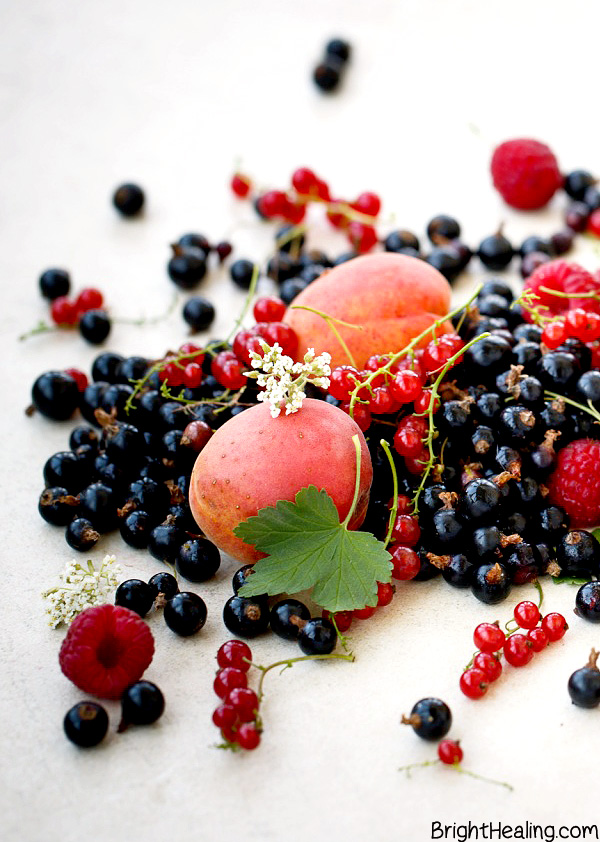The blackcurrant is a shrub growing to 2 m heigh with woody branches. The leaves are deeply lobed. The white flowers are rather small and grow show in short clusters. During summer the familiar small, shiny, dark purple (almost black) berries are formed. All parts of the plant, but especially the young buds have a strong and typical blackcurrant fragrance.
Currants are native to central and northern Europe and Siberia. It is a fast growing, deciduous, small shrub reaching about 5-6 ft tall. In general, currants grow best in the regions where summers humid but winter is severe and chilling.
Currant is a small shrub belonging to the family of Grossulariaceae, in the genus; Ribes. Its scientific name: Ribes nigrum.
Health Benefits of Black Currants
– One of the beneficial effects of eating fruit and vegetables like blackcurrants is their antioxidant activity against conditions such as cardiovascular disease, cancer and the degenerative diseases of ageing. The main antioxidant compounds present in blackcurrants are phenolics (including flavonoids and anthocyanins) and vitamin C.
– Black currants carry small but significant amount of vitamin A, and flavonoid anti-oxidants such as beta-carotene, zea-xanthin and cryptoxanthin levels. 100 g fresh berries provide 230 IU of vitamin A. These compounds are known to have antioxidant properties. Vitamin A is also required for maintaining integrity of mucus membranes and skin, and essential for healthy vision. Furthermore, consumption of natural fruits rich in flavonoid anti-oxidants helps to protect from lung and oral cavity cancers.
– The purple/black colour of blackcurrants indicates the presence of the anthocyanins, which have exceptionally strong antioxidant activity as well as other health-promoting qualities. Research shows that blackcurrants rank significantly higher in levels of antioxidant activity than other fruits.
– The fruits, leaves and buds of the black currant have multiple effects in treating and preventing various diseases. Because it contains vitamin C, the black currant is used in treating cardiovascular diseases, preventing cardiac insufficiency and vascular accidents, it increases the resistance of fragile sanguine capillaries, reduces arterial hypertension. Also, it intensifies weak peripheral circulation caused by menopause, cleans the blood of toxins, wastes and cholesterol.

– They also carry good amounts of mineral iron. 100 g currant berries provide about 20% of daily recommended levels. Iron is an important co-factor for cytochrome oxidase guided cellular metabolism. It is also required for red blood cell (RBC) production in the bone marrow.
– Scientists at the Second International Blackcurrant Association Conference recently held at Beaune, in France, had detailed research into the effects of blackcurrants on mental acuity and their special ability to reduce plaque-type formations, and the proven effect of berry polyphenols on improving decision-making under stress. In Japan and France researchers had focused on the ability of the blackcurrant to improve visual acuity by reducing the eyestrain from fixed-focus activity such as during computer games. Other Japanese research had shown blackcurrant extract could improve eyesight in dawn-dusk conditions and also improve blood circulation in hands in extreme cold.
Favourite common dishes that people like to add blackcurrants too include, morning cereals, fresh juices, a delicious array of deserts for the sweet tooth, home-made jams and healthy smoothies for people on the go.
Blackcurrants can also complement salads and even condense down into a sweet alcoholic liquor enjoyed with your family and friends.With all this in mind, one could definable conclude that these marvelous little berries are one of the blessings the fruit world has granted us. Black currant fruits can also be consumed in form of syrup, jelly, jam, fruit jelly, marmalade or liqueur.
Black currant fruits can also be consumed in form of syrup, jelly, jam, fruit jelly, marmalade or liqueur.
